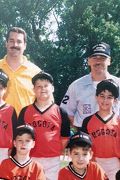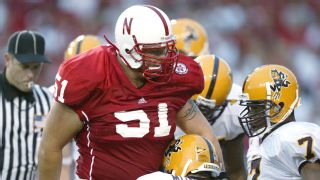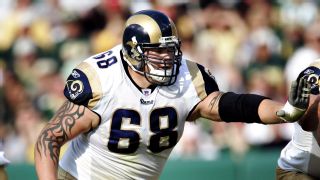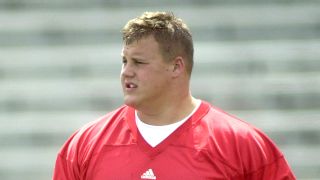|
He is delightful in this photo, baby-faced with a double chin, smiling near his proud pop. What red-blooded American man doesn't have a photo like this sitting in an old drawer, of a boy in a baseball uniform, posing awkwardly under a backdrop of trees, standing one with his team? Here, Richie Incognito is harmless. Vulnerable, almost. It might not look like it, because he's bigger than the kids in this photo, but he's also two years younger than they are, a constant theme for Incognito back then -- too big to play with kids his own age, too young to handle the boys around him. What isn't captured in this shot are the tears. Or the fits he threw when he struck out. Or the heckling he took when he arrived back in the dugout and was called "idiot" or "fatso." These days, it's not easy tracking down people willing to talk freely about Incognito, the biggest story in sports right now because he could become the first man punished -- perhaps even banished -- by the NFL for bullying. So it's surprising how quickly Kerry Deutsch came up with this rare photo of Incognito. He sent it from his cellphone. Deutsch, a longtime youth coach in New Jersey who's now retired, has worked with hundreds of kids but distinctly remembers this little big man.  Incognito was 8, maybe 9 years old, and already was boiling with passion and intensity. His dad, Richie Sr., was an assistant coach and equally riveted. "Big Richie" and "Little Richie." That's what they called them in the Bogota (N.J.) baseball association. "He used to be a tile installer," Deutsch said of Incognito's dad. "He was a hardworking guy, but he pushed Richie. He wanted him to be the best. I think he was probably upset when he didn't do well, and the kid was probably upset that his father wasn't happy with him at that point, too, you know?" Deutsch paused. He doesn't know what to make of the controversy involving Incognito. Jonathan Martin abruptly left the Miami Dolphins last week and reportedly checked himself into a hospital to be treated for emotional distress, Incognito was fingered as a main source of the young lineman's distress, and now everyone who knows or knew Incognito is being asked why. Is he a racist, as voice mail and texts provided by Martin's representatives suggest? Is he a bully? Every day, the pendulum of the story seems to swing in the opposite direction. He's a monster; he's a great teammate and an "honorary black man." He's Martin's enemy; he's his friend. He'll never play in the league again; he'll get another chance because this stuff happens all the time inside locker rooms and Incognito represents what every team needs. For now, there are just a few certainties. That Incognito is suspended and that the NFL is investigating allegations of harassment and hazing in the Dolphins' locker room. That, for much of his life, Incognito has crossed numerous lines, and, because he plays professional football, his actions have been received as both humorous and villainous. "I really don't know. I'm not Dr. Phil," Deutsch said. "I don't think he was a very mature kid at a young age. And I guess that's what's going on right now, is a little immaturity, too." • • •Offensive linemen aren't supposed to be noticed unless they've made a big mistake. Two weeks ago, most of the world didn't know who Jonathan Martin was, that he was a second-year NFL lineman who protected Andrew Luck at Stanford, that he's soft-spoken, smart and has lawyer parents who matriculated at Harvard. But nearly everyone had heard of Incognito. He's been voted the league's dirtiest player; he's been the recipient of the "Good Guy" award from the local media in South Florida. He was the funny guy in HBO's "Hard Knocks" series last year who figured out a teammate's password and posted on the guy's Facebook account. People who play with Incognito generally like him, and people who play against him generally hate him. Here's how famous and infamous he was at the University of Nebraska -- he was often talked about more than the starting quarterback. He played to the whistle and through the whistle. He was a tough guy, and Nebraska fans liked that. When the Arizona prep star committed to Nebraska, it was considered a fairly big coup. But eventually, Incognito's act has grown tired just about everywhere he's been. He spat on a Troy State player; he picked a fight and was ejected in a blowout loss at Penn State. This happened in the span of four weeks of his redshirt freshman season.  "He cost us a couple games," recalled one former NU assistant who declined to be named. "He's been a problem all along." Incognito was suspended for undisclosed reasons in the spring of 2003 and was sent to the Menninger Clinic in Topeka, Kan., to be treated for anger management. Inside the Nebraska football offices, there were serious discussions over what should be done with him. Some saw him as a time bomb and fretted over what might happen if that aggression seeped off the field. In February 2004, Incognito got into a fight at a party, and he eventually was found guilty of misdemeanor assault and fined. A few months later, under new coach Bill Callahan, Incognito was suspended indefinitely for a repeated violation of team rules. One of those violations was believed to center on a fight with teammate and friend Grant Mulkey, a fight that Incognito reportedly provoked and that required numerous teammates to break up. Incognito was released from his scholarship in September 2004 and left Lincoln. He went to Oregon, signed a code of conduct contract … and lasted about a week. Former Ducks coach Mike Bellotti, an ESPN analyst now, said Incognito violated the contract but wouldn't say how. "I did get the feeling that he felt bad about what happened," Bellotti said. "He wanted another chance. He was willing to work really hard to change who he was so he could go on and play football." • • •This was no Neanderthal jock. He could be loud and obnoxious, sure, but he was also charming and smooth. In those meetings in which Nebraska coaches tried to figure out what made Incognito tick, and what to do with him, Incognito could come across so calm, so intelligent, in stating his case. Former NFL teammate Jacob Bell, a good friend of Incognito's, affectionately compared him to Eddie Haskell, the funny, smart-mouthed sycophant from the 1950s show "Leave It to Beaver." He could say "yes sir" and "no sir" to an authority figure, polite as punch, then turn around and engage in another act of tomfoolery that would bring levity to a long and hard practice. Wherever he went, Incognito made a strong impression with his peers. You don't forget a name like Richie Incognito. In 2000, he attended the Big Red Football School camp, a place where most 16-year-olds would want to mind their p's and q's and leave a positive vibe for coaches. Incognito, according to two campers that year, was bored on his first night in Lincoln and decided to mix things up. "He got this brilliant idea that, 'Hey, let's try to get some girls to come over and strip for us,'" said Chris Manning, who at the time was a 130-pound JV player from Kirtland Central High School in New Mexico. "He got money from all the guys, and at some point he called [the service]. The R.A. [resident assistant] obviously stopped the girls at the door and sent them packing." Cody Wheeler, a former prep teammate of Manning's, remembers the hundreds of dollars Incognito collected, and the stern chewing-out the boys received the next morning from Nebraska's coaches. They were warned that they'd be sent home if anything else happened, and it scared some of them. Their parents had spent good money to send them. But the ringleader, Manning said, was never identified. And Incognito was undaunted. "He was loud and outspoken, from what I can remember," Manning said. "My best guess is he's just an attention-getter." • • •They tried. The Cornhuskers tried to keep him in line -- because who'd want to lose an ubertalented lineman with linebacker speed? Richie Incognito Sr. tried his best to help his son succeed. He hated when those kids picked on his boy back in New Jersey. He would admonish the kids in the dugout, Deutsch said, trying to get them to stop. When Little Richie was 11 or 12, the Incognitos moved to Arizona, in part because his dad wanted him to be able to play baseball year-round, Deutsch said. The elder Incognito, a Vietnam veteran, is described as loyal and protective and has been outspoken in defending his son in message boards over the years. In a post that is believed to have been written by Richie Sr. about 10 years ago, he told Huskers fans of their family background. The poster wrote that Richie wasn't raised with a silver spoon in his mouth. He shared his own background, that he grew up in a rough neighborhood in Union City, N.J., where he said he learned the ropes of life. "You also discovered the harsh reality that you and your family were not one of the so-called chosen ones," he wrote. "It was a community where your word was your word, it meant everything to you. It was your honor, your future, and in some instances, your life." Richie Incognito Sr. did not respond to an interview request for this story. The younger Incognito attended Mountain Ridge High School, which is located in a middle-class, mostly white neighborhood in Glendale, Ariz. Jim Ewan, his football coach at Mountain Ridge, said he never saw anything that made him believe Incognito was racist -- numerous people with interactions with Incognito were interviewed for this story, and none of them labeled him racist. Ewan called Incognito a "low-maintenance kid," even though he did cause some minor trouble in those days. He worked hard in practice, Ewan said. He became massive after many hours in the school weight room. "I disciplined Richie a couple of times," Ewan said. "I disciplined hundreds of players. And his dad probably had his feelings hurt more than Richie when I disciplined him." The younger Incognito, by this time, seemed unflappable. There were codes at Nebraska, such as respecting your elders and knowing your place, especially for a freshman on the offensive line. But Incognito was oblivious to them. He didn't care how competitive it was, that 20 guys were fighting, ugly and violently, for five spots. Incognito was 18 years old, and, even then, he was so confident that he knew he wouldn't earn their respect as much as he would command it. He immediately went against the grain by talking smack to the upperclassmen. When he was told to knock it off, former NU linebacker Steve Safranek said, he generally did. But if a guy didn't stand up to Incognito, it seemed to fuel him and the intimidation intensified. "In my opinion," Safranek said, "he was perceived as a young guy who was really damn good at football, who just had a certain attitude and a certain confidence about him that, yeah, if it wasn't checked, he could get out of control. At the same time, he was viewed as a tough guy that you wanted in your corner."  • • • • • •Incognito wowed the scouts with his immense physical skills at the 2005 NFL combine, but he stumbled during a drill and had to be carted off for a knee sprain. The injury didn't cause him to drop in the draft; the character questions did. He was picked in the third round by the St. Louis Rams, adding toughness to a franchise seemingly in need of some attitude. Incognito had his share of run-ins with teammates, including multiple scuffles with former Rams cornerback Dwight Anderson, who was more than 100 pounds lighter than Incognito. Anderson, contacted through his current CFL team, the Saskatchewan Roughriders, declined to comment for this story. But there are plenty of teammates, from St. Louis to Miami, who will vouch for Incognito. Jacob Bell, who walked away from the NFL last year to educate players about the risks of football, is passionate about his respect for Incognito. "Best thing I can say is he had a lot of friends," Bell said. St. Louis linebacker Will Witherspoon said Incognito is a guy who looks out for his teammates. "When your quarterback is getting abused back there, he's the first guy to step up and say something," Witherspoon said. "In that aspect, he's a guy you want to have on your team. In some ways, Richie is also a guy who is a little harsh and abrasive to some guys, and they don't know how to deal with that." Incognito was obviously seen as an important fixture in the Dolphins' locker room. He was voted in as a member of the team's leadership council. And, with each day that passes in this scandal, which has mushroomed, Incognito's teammates in Miami are louder in their support for the suspended lineman.  In a small town a planet away from South Beach, Jack Limbaugh watches it unfold and hopes for the best for Martin. Limbaugh, who works at his family's tire business in Algona, Iowa, once had his fill of Incognito and walked out of a practice at Nebraska. Limbaugh is hesitant to talk about it now. He calls himself "a nobody" in the grand scheme of all this. But years ago, Limbaugh was just a kid who loved football, who turned down scholarships from Iowa and Iowa State to walk on at Nebraska. He knew what being an offensive lineman meant at a place like that. He used to have the Sports Illustrated cover with Nebraska linemen Zach Wiegert and Brenden Stai hanging on his bedroom wall. Limbaugh loved football because of the physicality, because of the camaraderie. He was a quiet guy who was Academic All-Big 12. Incognito used to push his buttons, used to taunt him, and he kept doing it because Limbaugh refused to fight back. Anything that could get under Limbaugh's skin, Incognito would do it. Then, one day in 2002, Incognito -- just a redshirt freshman then -- blindsided Limbaugh and knocked him to the ground for no reason. Limbaugh got up, took his equipment and walked out of practice. Although leaving a practice like that would normally be a punishable offense, Limbaugh said, he did not get in trouble that day. Apparently, the coaches knew he had endured enough. So, Incognito is at the center of this controversy now, and Limbaugh was going to keep quiet. But then he thought about his boys, one of whom plays flag football. He thought he'd say something. "You hear people say, 'Oh, this is the culture in the locker room,'" Limbaugh said. "Well, I have two young sons, and if that's going to still be the culture in the locker room and the way people treat each other, I don't want to be part of that." Limbaugh said the culture isn't going to change unless people stand up and say it isn't right. And today, people are standing up. For Incognito. Elizabeth Merrill covered Nebraska football from 2002 to 2005. ESPN writers Nick Wagoner and Tim Keown contributed to this story.
|

